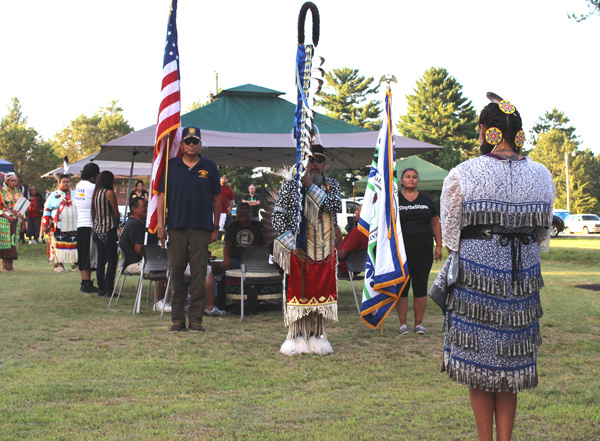 Over two hundred tribal members attended a powwow in Black River Falls to offer their support to those affected by drug and alcohol addiction.
Over two hundred tribal members attended a powwow in Black River Falls to offer their support to those affected by drug and alcohol addiction.
“We have so many people that are sick and suffering,” said tribal member Tena Quackenbush. “And we just want them to know that we are here for them.”
The gathering was held on Aug. 12 at the Indian Mission, and called the Wogixete Wi Powwow. Its name came from the Ho-Chunk language and has been translated to the ‘Loving Us’ Powwow.
“I was trying to figure out what we need to do to bring our people back to us,” said Quackenbush, who helped coordinate the event. “And the words ‘loving us’ came to mind.”
Quackenbush used the powwow as a way to advocate love and compassion toward those who are struggling, rather than bitterness or anger. She said that positivity is the only effective way to address the problem.
“Love is the ultimate key,” Quackenbush said. “That’s the very beginning – letting our people know that we love them.”
The event included traditional dancing and singing, and music from two local drum groups.
It also featured three prominent guest speakers, who each had a unique message for their listeners.
First to talk was tribal elder and Eminent Speaker Gordon Thunder, who discussed the way things have changed over the years. He said that time has brought with it many problems that simply did not exist in the past.
“Today’s society is a little bit different,” said Thunder. “There’s a lot of things that came to us.”
However, he said, they should not be allowed to become permanent problems. He said that a change needs to take place for the sake of future generations.
“Today is the beginning of a different way,” Thunder said. “This is the time to stand up and say that we’re going in a different direction.”
Next to speak was State Senator Kathleen Vinehout, who shared a story about an old man and his flock of sheep. The shepherd left the 99 sheep that he had in flock, in order to find one that had gone astray.
The story served as a metaphor for the people who have lost their way in life and may need help finding it again. The politician said that rescuing these lost souls should be a priority for everyone.
“Reach out to someone in need,” Vinehout said. “Bring them back from the brink of disaster.”
The senator then promised tribal members that she would do everything in her power to prevent future drug overdoses. She swore to stand up for what’s right, even if it meant losing friends at the capitol.
“I will be by your side,” Vinehout said. “I will be fighting in Madison for what you are fighting for now.”
The last speaker of the evening was a well-known Native American activist named Clyde Bellecourt. In the 60s, he co-founded the American Indian Movement (AIM) to address issues that were affecting indigenous people throughout the country.
Bellecourt said that the current drug epidemic is just as important as the social problems AIM faced years ago, and something that demands his people’s full attention.
“Better wake up,” Bellecourt said, “because we’re losing our children.”
He encouraged everyone to take action, rather than sit back and wait for a solution to present itself. He said that an active approach is needed, to truly confront the situation.
“We need to rally together,” Bellecourt said. “And we can take this issue on.”
Each of the speakers was presented with an honorary Pendleton blanket, as a symbol of appreciation for sharing their time and wisdom. Credit was also given to Tena Quackenbush, who played a large part in putting the event together.
“The purpose of the powwow was just to let all of our people know that we love them,” Quackenbush said, “and that we want them to come back to us alive.”
In an effort to reduce the number of drug-related deaths in her community, Quackenbush has spent much of her adult life spreading awareness about the resources available to those suffering from drug and alcohol addiction. She has also tried to make people more cognizant of the support network that surrounds them.
“We want our people to know that we are here,” Quackenbush said. “And we want them to know that we love them.”
To continue her mission, Quackenbush has founded the #StoptheStigma campaign in Black River Falls. She said that it will be sponsoring more events like the powwow, in years to come.




























